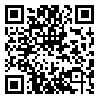BibTeX | RIS | EndNote | Medlars | ProCite | Reference Manager | RefWorks
Send citation to:
URL: http://jdisabilstud.org/article-1-2032-en.html
2- Assistant Professor, Department of Psychology, Kish International Branch, Islamic Azad University, Kish Island, Iran
3- Professor, Department of Psychology, Kish International Branch, Islamic Azad University, Kish Island, Iran
4- Assistant Professor, Department of Psychology, Karaj Branch, Islamic Azad University, Karaj, Iran
Abstract
Background & Objectives: The social adjustment of homosexuals is of particular importance, and if they do not adapt, there will be many consequences and problems for these people. Anti–homosexual social attitudes can explain a significant part of the tensions and incompatibilities of homosexual men. Attitudes, attributions, and social perceptions are three dimensions of social thinking or cognition. Attribution theory emphasizes the importance of why individuals attribute their own or others’ behaviors or causes to internal or external factors. The purpose of this study in the first phase was to build, validate, and credit the tool of attitude towards homosexuality. The aim of the second phase was to explain the relationship between attitudes towards homosexuality and social adjustment in gay men based on the mediating role of causal attributions.
Methods: The research method was validation in the first phase and correlational in the second phase. The statistical population of this study included all homosexual men living in Tehran in 2019. From the virtual networks related to the Iranian LGBT Rights Association, 206 people were selected by the available sampling method. The inclusion criteria were as follows: being homosexual, male gender, Iranian citizenship, living in Tehran City, Iran, lacking a debilitating physical disease (chronic disease), not receiving psychiatric interventions during the past year, and not taking drugs and addiction. Research tools included the Social Adjustment Scale (Weissman & Bothwell 1976), Attributional Style Questionnaire (Peterson et al., 1986), and Attitudes towards Homosexuals Questionnaire Dunjić–Kostić et al. (2012). In the first phase of the research, after receiving the questionnaire from its original creator and obtaining permission for translation, to check the validity of this questionnaire, the content validity ratio index (CVR) and the opinion of ten university faculty experts were used. In the second phase of the research, descriptive statistics (including mean and standard deviation) and inferential statistics (structural equation modeling and Pearson correlation coefficient) were used for data analysis via SPSS and AMOS software, and a significance level of 0.05 was used.
Results: The present study showed that the 2–factor model of the Homosexuality Attitude Questionnaire had an acceptable fit with the collected data (χ2/df=1.57, CFI=0.905, GFI=0.908, AGFI=0.871, and RMSEA=0.053). The direct path coefficient between attitudes toward homosexuality and social adjustment was positive and significant (p=0.016, β=0.320). The direct path coefficient between causal attributions and social adjustment was negative and significant (p=0.002, β=–0.482). The indirect path coefficient between the attitude toward homosexuality and social adjustment was negative and significant (p=0.008, β=–0.172). Goodness–fit indices used to explain the relationship between attitudes toward homosexuality and social adjustment in gay men based on causal attributions supported the fit of the structural model with the collected data (χ2/df=1.39, CFI=0.981, GFI=0.974, AGFI=0.944, and RMSEA=0.044).
Conclusion: According to the results, Homosexuality Attitude Questionnaire has the desired validity and reliability. Also, the relationship between attitudes towards homosexuality and social adjustment in homosexual men is explained based on internal, sustained, and general causal attributions.
| Rights and permissions | |
 |
This work is licensed under a Creative Commons Attribution-NonCommercial 4.0 International License. |



